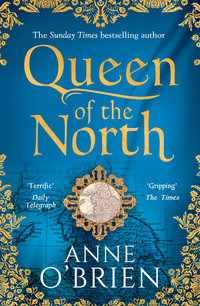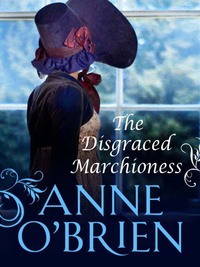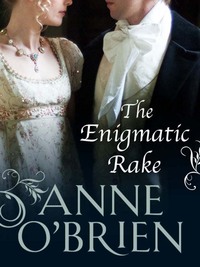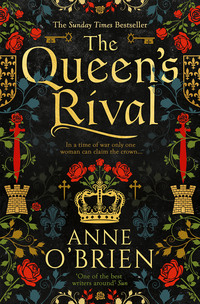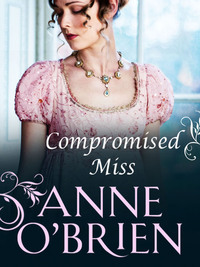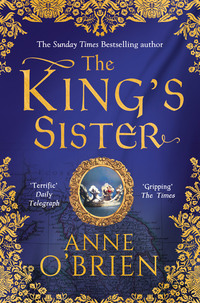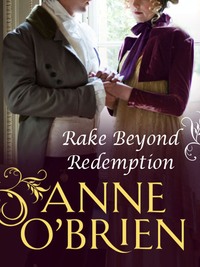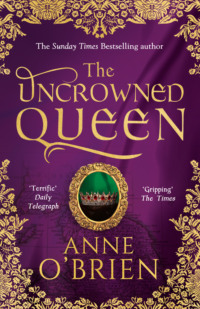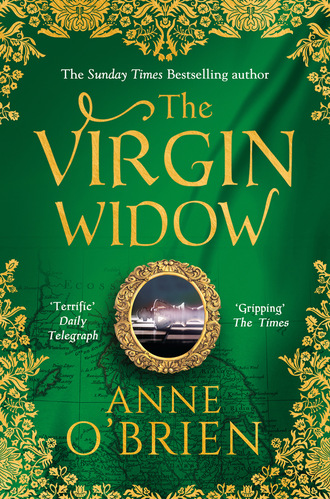
Полная версия
Virgin Widow
So my love was dead, I told myself. Killed by his perfidious preference for another. Not that he had ever led me to believe otherwise, honesty forced itself into my bitter thoughts. He held me in some affection, perhaps, but I wanted more than that. I wanted those intense kisses for myself. I wept hot tears of hopelessness.
When I could weep no more, I practised my own version of my mother’s severe dignity. I forced myself to stay away from him, chin raised, head tilted, the coldest of shoulders. I stared my reproach, but closed my lips when Maude served Richard with ale and a tilted chin, and he smiled that slow smile. My words were short and sharp when conversation was needed. Richard frowned, perplexed at my ill manners, but for the most part ignored my attempts to impress him with my heartbroken dignity. He asked Isabel if I was suffering from some form of ague.
It hurt. My feelings were not dead at all.
‘What is it like to be in love?’ I asked Isabel, driven against my better instincts to talk to someone who might know. ‘Is it painful?’
Isabel shrugged her uninterest. ‘I have no idea.’
‘Do you not love Clarence?’
‘No!’
‘But you would wed him.’
‘It is my greatest wish.’ Her smile was full of pitying condescension. ‘But love is irrelevant to people of our standing.’
Yet I thought she lied. I thought her heart was more than a little engaged despite her terse denial. Nor did love seem irrelevant to me. It was a most painful part of my existence. How could I love him and he not love me? I hated him for it and determined to have no pleasure in life.
‘I am bidden to London, madam. Immediately.’
I could see the simmer of anticipation in Richard. Despite my continuing coolness towards him, it was the news I had been dreading. Relations between the King and the Earl continued to lean and totter endlessly on a knife edge. So Richard would be gone at the King’s order, away from the Earl’s influence, and would never return. I hugged my silent misery as the preparation and packing up of his possessions, the leave takings, all merged together into one throbbing wound.
The Countess embraced him with real affection and a quick sadness. ‘We shall miss you. You have been like my own son to me.’
Francis staked a claim for future friendship. ‘I shall demand your royal attention when I too come to London. A tankard of ale at least for old times’ sake. Or will the Duke of Gloucester be too high for the likes of me?’ Francis demanded with the sly humour of deep bonding over inexplicable male issues.
Isabel wished him well in her self-important fashion.
Stony-faced, ungraciously monosyllabic, I swore silently that I did not care, that his absence would make no difference to me. In reality I was frozen with dismay. I had long ago given up the pretence that I was immune to Richard, although I guarded my words and my actions around him. The days of youthful confidences had long gone. Now I might never see him again unless we visited Court too, an unlikely event given the increasingly bad blood between our families. It cast a dark shadow over that cold January day with the promise of snow on the northern hills. It was no colder than my heart.
‘Will you not give me your hand in farewell, cousin?’ Richard had manoeuvred a moment of privacy within the swirling movement and bustle of the courtyard.
I did so, curtly. ‘God speed, Richard.’
‘I think you will not miss me.’
‘Of course I shall.’ I went through the demands of courtesy.
‘Then adieu, Anne.’ A flamboyant bow with his feather-trimmed hat as if he would mock my poor manners. ‘One day I shall see you at Court too.’
‘Perhaps.’
On a thought he leaned to whisper in my ear, before I could pull away, ‘Perhaps we would not have suited after all. Your affection for me seems to have quite vanished, little cousin. I would want a warmer bride at my side.’
‘No, we should definitely not have suited,’ I snapped back, ‘for I would demand constancy and loyalty in a husband.’
Richard laughed aloud at my stubbornness, eyes sparkling. I could see the excitement, the exhilaration. He wanted to be gone. Planting a kiss smartly on my cheek, he was mounted and away.
Thus it was a cold departure between us, and all my fault. If I could not have his love, I would not tolerate the mild warmth of his friendship. Now lonely and adrift and unquestionably guilty, trailing along the battlements to the spot where he used to stand to look out towards the south, I set myself to wallow in my own self-inflicted misery. For the first time in my life the confines of Middleham hemmed me in and my desire was to escape. If we were to go to London, Richard would be there…
Calais! Not Warwick. Not London. But Calais?
Why were we to travel to Calais?
It was eight years since either I or Isabel had last been to Calais so I had no memory of it. The Earl was often there, but why should he suddenly take it into his mind to transport his whole family with him? The Countess, who received the instructions from the Earl, saw no need to enlighten us.
I did not like it. There were too many secrets by half.
We journeyed south, rapidly, a strange journey, almost as if in flight from some unforeseen danger. First to Warwick Castle, not stopping there above two nights, but met there by my father. Then on to the coast at Sandwich where we took ship. There was a tension in the party, between my parents, that could almost be tasted. The uneasy crossing was also to match our mood, the seas cold and grey. Moreover, barely had we set foot on land, our household disembarked into the comfort of the great castle there with its formidable garrison, than the Earl turned on his heel and left again.
‘But why are we here, madam?’ Isabel asked crossly with no attempt to disguise her disapproval of the whole venture. With betrothal in her mind, and robbed of one bridegroom, this military outpost was no place to achieve another.
‘And where is the Earl gone?’ I added.
‘Returned to England, to the King’s service.’ It was the only explanation the Countess was prepared to give in all the dreary weeks of waiting—for what I didn’t know—that were to follow. I had the dismaying sensation that we had been abandoned there. But if the Earl had mended his friendship with the King, why must we be in this voluntary exile? More dark secrets as we sat in our stronghold in Calais, grasping at any crumb of news, all through that spring and early summer. We knew that the Earl spent time at Sandwich where he was fitting out his ship the Trinity. The Queen gave birth to yet another girl. There were rebellions in England, in the north, against high taxation. Edward had left London to collect an army to subdue them.
‘Will the Earl march with him?’ I asked, with ulterior motives. ‘And Richard too?’
But the Countess’s distracted reply troubled me even more. I had never known her so anxious as she was in those days. ‘Who knows the outcome? But at least the rebellions will keep Edward from concentrating too much on what we might be doing here!’
But what are we doing here?
I had given up expecting a reply. As for Richard, I gleaned comments as a mouse would seek out and store ears of corn against a hard winter. He was at the King’s right hand. He was marching north with him. He was present in Edward’s councils with Earl Rivers and my lord Hastings. He had become an important man at Court. Did he ever give thought to me? The passing weeks did nothing to make me miss him less.
Finally, hopelessly, to make some contact, however ephemeral, I was driven to pen a letter that I passed to one of the couriers who frequently travelled back and forth across the Channel. I addressed it boldly to the Duke of Gloucester. It had taken a long time and much thought because I did not know what I wanted to say other than to forgive my ill temper and not to forget me when all around was new and exciting for him. Eventually it was done.
To my cousin Richard Plantagenet, We are settled here in Calais. I know that you are engaged with your brother the King in putting down the rebels in the north. I pray for your health and your safety.
Perhaps one day I shall return to London and we can meet again as friends.
I regret the nature of our parting. It was entirely my fault. Perhaps you could find it in you to forgive me,
Your cousin,
Anne Neville
Excruciatingly formal and not at all what I wished to say. That I missed him—I could not say that. That I loved him—I could hardly lay my sore heart at his feet. In the end, what had I said that was worth the sending? And I had no knowledge if it would ever reach its objective and of course I received no reply. If Richard was in the north facing a hostile army of rebels, what time would he have for a foolish letter such as mine? In my lowest moments I could see him in my mind’s eye, crushing it in his mailed fist with a grunt of impatience as he spurred his destrier into the thick of battle.
‘I shall never see him again, Margery,’ I sniffed.
‘Not for a little while at least, mistress,’ she admitted, reading the subject of my thoughts. She opened her mouth as if she would say more. Closed it.
‘What do you know that I don’t?’ I demanded sharply.
‘Nothing, lady.’
I didn’t believe her, but my hopes died with the flicker of a spent candle.
At last—at last!—there were sails on the horizon, and more than one vessel. Then they were arriving and disembarking, the Trinity at the forefront, so I went with the Countess and Isabel down to the quay, formally dressed and in celebratory mood. Immediately the Earl strode across to our little knot of welcomers, his smile lighting his whole countenance.
‘Is all well?’ The Countess accepted his salute, hands grasping his as if she would not release them.
‘Better than you could ever hope.’
‘And the dispensation?’ I heard her murmur as she raised his fingers to her lips.
‘I have it. It has all but beggared me, but it’s safe.’ He clapped their joined hands to his breast, as if to a document, smiling down at her. Then he looked across, his eyes all for my sister. ‘Isabel—’ He beckoned. ‘I bring your bridegroom at last. I think you will not be disappointed.’ The Earl stepped back to allow us a clear view of the man who came behind him.
The Duke of Clarence.
Isabel dimpled and curtsied, face pink with disbelieving joy. I simply stood and watched as Clarence approached, bowing with studied elegance. He lifted my sister to her feet, kissed her fingers and expressed his pleasure in a voice as slick as close-cut velvet. ‘Lady Isabel. It enchants me to be here. I have lived for this day for so long.’
I simply stood like a carved marble statue, denied of thought or movement. I know I did not curtsy as I ought. I could not believe it. Was this what my father had been plotting? Outright rebellion against the King by bringing Clarence to marry my sister against Edward’s express orders?
Edward would never forgive us.
Edward would never support this match and Richard, standing solidly beside his brother the King, would be divided from me for ever.
I wished that trivial, ridiculous letter unsent.
I wished it even more two days later. The day after Isabel’s marriage, celebrated with much pomp, the Earl and Clarence did not hunt with the rest of their guests, but took themselves to a private chamber. By the end of the day there was a document, written and copied by the clerks, openly distributed for all to read, and sent to England on the first ship to be proclaimed in London.
I read it.
It was not difficult to obtain a copy wet from the clerk’s pen. It was an astonishing piece of reckless treason that finally buried even the slightest residue of hope of my being reunited with Richard. Its words were uncompromising. King Edward was guilty of poor government, wilfully ignoring the Princes of the Blood—the Nevilles, of course—who would advise him well, but guilty of giving ear and patronage to evil advisers named as the Woodvilles. They must be removed for the good of the realm. If the King did not comply with the wishes of his subjects, then he should suffer the penalty of other feckless monarchs who had brought their country low. Did he not deserve the same punishment as the ill-fated Edward II and Richard II? I had learned my lessons well. They had both been done to death by foul means in distant castles. Whilst Henry VI, also included in the list, ageing and mad, was a prisoner in the Tower.
All true men of England should rally to the Neville standard, to the Earl of Warwick, who would right the country’s wrongs.
Well! This was what the Earl had plotted in all these weeks I had remained in ignorance in Calais. The words I held between my hands were dangerously treasonous, a direct and open challenge to Edward’s authority, enough to put a price on my father’s head. It would brand us all traitors.
When I showed her the letter, all Isabel could see was the glitter of the Crown that would grace her brow. ‘We shall not be traitors! Don’t be stupid, Anne! I shall be Queen of England before the year is out when my father has removed King Edward and made Clarence King.’ She closed her ears to my anxieties.
I was not so sanguine
‘Is this a declaration of war?’ I demanded of the Countess when I could not bear the uncertainty longer. ‘Does he intend to depose Edward?’
I thought she looked as astounded as I felt at the lengths to which the Earl was prepared to go. ‘I can see no other outcome,’ the Countess confirmed. Her face had the sallow pallor of candlewax.
Neither could I. As daughter of a traitor, what hope was there now for me? Richard would surely hate me.
Chapter Five
ISABEL retched over the bowl held by the indomitably cheerful Margery. ‘I wish I could die,’ she gasped when she could.
‘No such thing,’ Margery soothed. ‘My lord of Clarence has performed more than well. Such a potent man beneath all that pretty gold hair.’ From my position at the far side of the room I smirked at her less-than-respectful observation. ‘An heir! And so soon!’ she continued. ‘Let us give thanks to the BlessedVirgin.’
Isabel pressed a square of linen to her mouth as another spasm gripped her. I might have escaped, but the Countess swept in, followed by a serving girl and a covered platter.
‘We will soon put you to rights. Drink this, Isabel.’
I had to admire her. As if she had no thought beyond Isabel’s ills, as if the Earl was not engaged in armed rebellion against the King, the Countess took my mewling sister in hand.
Isabel gulped, swallowed desperately. ‘I cannot—’
‘Don’t be stubborn.’ I could smell the infusion, the sharp, fresh aroma of mint steeped in boiling water that pervaded the whole room. When Isabel obeyed, the Countess nodded, satisfied. ‘Good! You are not ill, Isabel. Merely breeding. For which you should be grateful, within weeks of your marriage.’
‘I don’t want this…’ Isabel whined.
‘Why not?’ I could no longer keep silent as envy of my sister’s Plantagenet husband once more coated me in shameful malice. ‘It’s what you wanted, well enough, when we were at Calais! A husband and a Plantagenet heir. Now you have your wish! You have both.’
I might scowl at her, but I was not truly so heartless, merely troubled and un-bendingly hostile to the man who had put her in this situation and then, it seemed to me, unfeelingly abandoned her. Isabel had not set eyes on her royal husband since that brief interlude in Calais, now two months since. The bridal rejoicings had been cut short when the Earl and his fellow conspirators left immediately to return to England as an invading force, to raise men in Kent and march on London. From there the plan was to continue north to force Edward to come to terms. Meanwhile we were ensconced in Warwick Castle waiting for events to settle around us. At least Isabel’s condition took our minds off other more immediate concerns, such as the bloody penalty for treason—but Clarence could have come to see his wife.
‘Where’s Clarence?’ she asked as she had asked so often. ‘Why is he not here with me?’
‘He’s in London, trying to reassure the Lord Mayor and Aldermen that the government of the realm won’t disintegrate around their ears. He holds the reins of power there in the King’s name. He’ll come when he can.’ The Countess stroked the damp hair from her forehead. ‘Come and read to your sister, Anne. It will take her mind off her belly.’
And I did because I felt sorry for her, left alone. As my heart was sore for my mother who was able to do nothing but wait on events that shook the kingdom. I feared for the outcome.
We had not been short of news. There had been a battle, destroying much of the King’s army, and the Woodvilles had come to grief in the aftermath. Earl Rivers and his son Sir John Woodville had been summarily executed. Impossibly weakened, Edward against all expectation had become my father’s prisoner. Was not the whole world turned upside down, with the Earl, once the supreme champion of the Yorkist cause, now the arch-adversary of the anointed wearer of the crown? Planning to call a parliament in York, my father took Edward north with him to Middleham under restraint. I know that the Earl assured everyone that all his actions had the approval of the King, and that he had the King’s signature on all documents with no duress, but how would we know truth from lies? I did not think Edward would make so amenable a captive.
‘I wish we’d stayed in London,’ Isabel, revived and sitting up, interrupted my thoughts and the dolorous tale of the trials of St Ursula and the Thousand Virgins.
‘You would be just as sick in London as you are here,’ I muttered. ‘There are no Court festivities to entertain you with Edward a prisoner.’
‘But think of the merchants, Anne, with their cloth and jewels and fashionable wares. Would that not be entertaining? We are in need of new gowns. You are growing by the day.’
‘Yes,’ I admitted, aware of the restrictions of my bodice. ‘And so will you be!’
Isabel laughed. ‘So I shall. Tell me that you would not wish to be there.’
‘I cannot…’ For I wished it above anything.
‘And I would see Clarence…’
Her face drooped again. All I could do was hold her hand and continue to read for I had no words of comfort. I knew the Duke of Gloucester too was in London, at liberty but impotent whilst Edward remained under my father’s hand.
Yes, I too wished that we were in London.
I would have moped excessively except for an unexpected visitor to our gates. Francis Lovell arrived with a well-armed escort en route between London and Middleham. I had missed his arrival; I would not miss his departure. So I sat in the stable yard on a mounting block and kicked my heels, as windblown and dust-covered as any of the serving girls, rejoicing inwardly at seeing him again after almost a year. I longed to talk to someone other than Isabel, someone who would tell me what was happening outside the walls of this castle. Someone who had been in London as well as at my father’s side, had experience of this country being torn in two again, York against Lancaster.
I was considering the implication of that final thought when at last he turned in through the gateway from the inner courtyard.
‘Francis! Over here!’
I raised my hand and, seeing me, he changed direction. It gave me the chance to watch his athletic lope, to assess the changes wrought by the intervening months. All I saw at first was the familiar gait, the pleasing features, the deep affection in his instant grin. But then, studying his face, I thought he looked older. Very much Lord Lovell rather than the mischievous boy with whom I had grown up. There was no mischief now lurking in his eyes. Indeed, I decided there was an altogether harder edge about him, as if he had faced things that were unpalatable and been forced to make a difficult choice…
My breath caught. My heels stilled against the worn stone. My thoughts circled around Francis’s present position, his past and present loyalties. And it thudded home, a dull blow to just below my heart. That all the ease of the past between Francis and my family could well be destroyed. I could see the muscle tension in his shoulders, the abrupt turn of his head to shout instructions for his escort to mount. I could see it in new lines in his face. He was uncomfortable in this role he was playing, in his visit to Warwick. I thought I knew exactly the reason why. I had wanted so much to see him, talk with him, but it was to prove a harsh lesson in reality for me, and one I would never forget.
‘It’s not good news.’ His first words as he hoisted himself on the stone beside me. He knew I would want to know and made no attempt to dilute the details. ‘There’s a new outbreak of rebellion in the north, this time in the name of old King Henry.’
‘Henry?’ I had all but forgotten his existence, shut away in the Tower. ‘Can the Earl not put the rebels down?’
‘Not easily. Rumours abound that King Edward’s dead, you see, since he has not been seen abroad for some weeks. So many would rather return to the old way than accept…’ His words lurched to a halt.
‘Than accept the authority of the Earl of Warwick?’ I sighed.
‘That’s the sum of it.’ His mouth snapped shut like a trap. Then, ‘The Earl is finding it difficult to raise troops. I can tell you no more than that. Loyalty is become an issue for everyone…’
I had been right in my suspicions. Dare I ask him outright? I tried a flanking action first. ‘Did you see Richard in London? Where are his loyalties?’
Francis’s face set in hard planes I could not fail to interpret. ‘He’s with Edward and will remain so committed. He’ll not consider treason.’
Treason! ‘Would he not even consider throwing in his lot with Clarence? With my father? For the good of the realm, if such a move will restore it to peace?’
‘Never! He will not.’
‘And what of your loyalties, Francis?’ We could fence around this for hours. I decided the more direct approach, at the cost perhaps of hurting him, was my only choice.
‘As the ward of the Earl, my allegiance is to him,’ he replied as if he had learned the words by rote, but with his heart not in them. I could almost see his hackles rise and his eyes bored into mine. ‘What do you imply, lady?’
‘I would never question your loyalty, Francis,’ I replied gently. ‘Forgive me…But, Francis! Honest, now! You are the Earl’s man—but have you never thought of going over to Richard?’
His answering smile so faint as to be non-existent, shadows in his face. ‘You were never one to mince words! I’m trying to compromise here, within the shades of loyalty.’ He sighed. ‘My whole life seems to be one of compromise!’
‘Is it difficult? Is it possible to do so?’ Would I ever be able to compromise if it were asked of me, to put my heart before my upbringing and sense of duty? I didn’t know. I thought it would be an impossible decision to make.
‘Difficult! Ha! I detest it! Anne…I hope you never have to make such choices.’
How terrible this choice was for him. His inclination based on deep and lasting friendship was to stand at Richard’s side. On the other side of the coin, the bonds of warmth and compassion, of family, created in our household where he had been raised remained firm.
‘I might be wary of the Earl’s policies, but as his ward I owe him fealty—and I have much affection for the Countess.’ He groaned. ‘My heart tells me to be Richard’s man.’ Francis rubbed his hands hard over his face as if he could erase the conflict, but merely left a smudge of dust of his cheek.
Now I understood for the first time the strain of being pulled apart by conflicting fidelities, when family warred with other commitments. How to choose? How to decide? I too was torn, but I had no choice. I was a Neville, and too young to take a stand against my family. I could only mourn Richard’s absence and loss. But Francis could make his own choice, and the result could be nothing but painful. No wonder he looked strained and weary.





